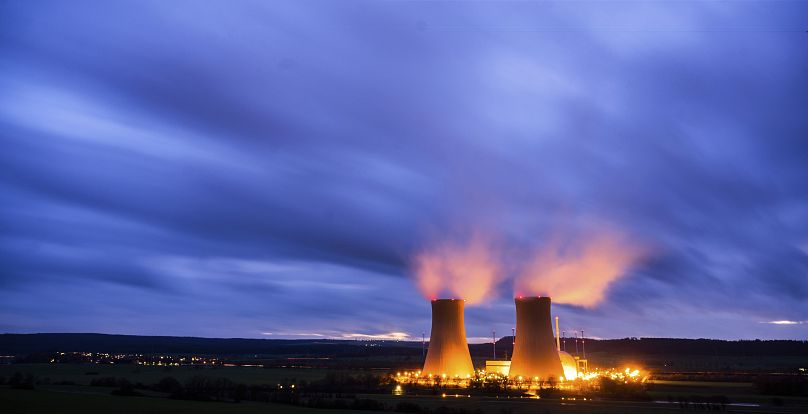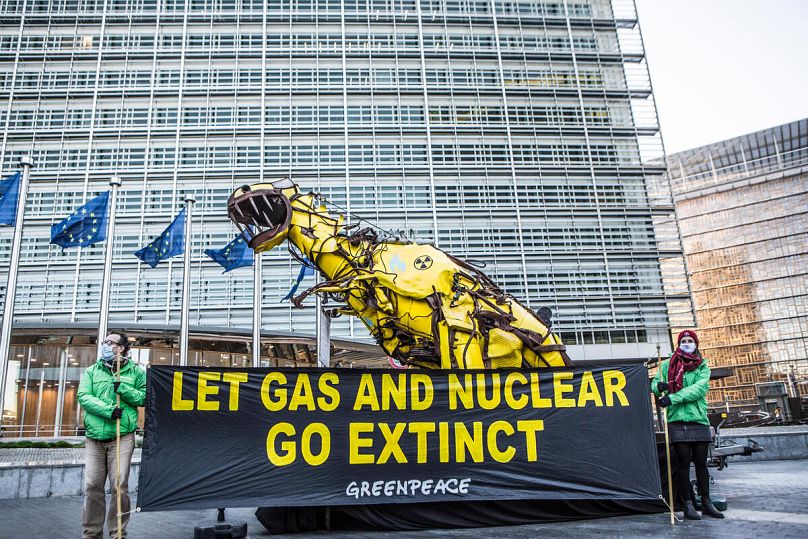Brussels has proposed labelling natural gas and nuclear as green energy sources, prompting a furious backlash.
Europe has entered a new year and a fresh political storm is already raging across the continent.
 ADVERTISEMENT
ADVERTISEMENT
 ADVERTISEMENT
ADVERTISEMENT
In the very last hours of 2021, the European Commission took the first steps to label natural gas and nuclear energy as green energy sources under the EU taxonomy, a technical rulebook that identifies sustainable activities that contribute to the green transition and comply with the Paris Agreement.
The backlash came with great speed and fury: Greenpeace blasted the plans as "licence to greenwash" and Austria raised the spectrum of legal action against the executive. The Commission stood its ground and argued the green label will be temporary because gas and nuclear will act as "transitional" technologies towards a carbon-neutral society.
The bitter reaction cast an immediate shadow over the credibility of the EU taxonomy, a novel instrument that was formally adopted six months ago to help private and public investors make informed choices about climate-conscious investments.
The catalogue covers a long list of projects that make a "substantial contribution" to at least one environmental objective of the EU's climate policy while avoiding significant harm to any of the others. It currently includes sectors such as solar energy, geothermal, hydrogen, wind power, hydropower and bioenergy.
But when Brussels introduced the rulebook back in April, two fields were conspicuously absent: natural gas and nuclear energy. The delay was blamed on the long-standing and deep-rooted disagreements among EU countries around the future of the two controversial resources.
On one side of the table, a group of countries, passionately led by France, defends nuclear as a low-carbon, stable and independent energy source that can make up for the shortcomings of renewable systems, guarantee constant supplies and reduce price volatility.
On the other side, Germany, with the support from Austria, Denmark, Luxembourg and Spain, opposes the move and argues the concerns related to radioactive waste, whose life-cycle encompasses several thousand years, are enough to disregard nuclear as a green alternative.
But Germany, like many other EU countries, is heavily dependent on natural gas to meet all its energy demands and fill the gap left by the gradual phase-out of coal, the most polluting fossil fuel. Burning natural gas generates fewer CO2 emissions than burning coal but the process often leaks methane, a potent and dangerous greenhouse gas.
Although the roll-out of renewables has accelerated across the bloc, natural gas still accounts for more than a quarter of total energy production, which makes its short-term disappearance all but impossible. The EU imports the majority of its gas from external partners, a factor that leaves member states vulnerable to market fluctuations and entails important geopolitical implications.
'Clear and tight conditions'
The taxonomy dilemma has been haunting the European Commission for the past few months, with EU countries sending public letters and declarations to make their cases. Civil society also piled on the pressure on the executive and called on its president, Ursula von der Leyen, to resist lobbying from member states and honour the commitments enshrined in the European Green Deal.
In the end, the Commission opted for a path that would give all sides of the debate something to be satisfied with in order to prevent the emergence of a blocking majority (that is, at least 20 EU countries representing at least 65% of the bloc's population).
"Taking account of scientific advice and current technological progress, as well as varying transition challenges across member states, the Commission considers there is a role for natural gas and nuclear as a means to facilitate the transition towards a predominantly renewable-based future," the executive said in a press release.
Brussels has underlined the two energy sources will have to respect "clear and tight conditions", such as high safety standards for nuclear reactors and a limit of 270g of CO2 per kilowatt-hour for natural gas plants, according to a leaked draft. Gas installations will have to receive a construction permit by 31 December 2030, while nuclear sites can wait until 2045.
The decision has already being reviewed by an expert group on sustainable finance and is expected to be adopted by the end of January or early February. The EU co-legislators, the Council and the European Parliament, will then have four months to analyse the document and raise objections.
The negotiations promise to be heated and divisive.
In Germany, Steffi Lemke, the environment minister of the new three-party coalition, said the inclusion of nuclear energy inside the taxonomy was "absolutely wrong". Claude Turmes, Luxembourg's energy minister, called the draft a "provocation" while his Spanish counterpart, Teresa Ribera, argued the plans "make no sense" and send the "wrong signals" about the EU's green transition.
Meanwhile, Austria has already threatened to sue the Commission if it goes ahead with the proposal. Natural gas and nuclear "are harmful to the climate" and "destroy the future of our children," wrote Austrian Climate Protection Minister Leonore Gewessler on Twitter.
Luxembourg, Spain, Austria and Denmark later joined forces in a joint statement rebuking the proposal for lacking a scientific base and damaging the EU's reputation as a leader in climate action. Germany has also doubled down its oppositionto nuclear but has moved towards an explicitly gas-friendly position, going as far as suggesting that regulatory restrictions on fossil gas should be relaxed.
Making matters more complicated, the arrival of the Commission's decision coincides with the French presidency of the EU Council, which is set to occupy the first six months of the year and therefore take the responsibility of spearheading the difficult discussions. The presidency's official programme does not mention the taxonomy by name but describes nuclear as a way out of the ongoing energy crisis and rising prices.
"It’s only January but petty ideological disputes are once again trying to override the interests of Europe," said Judit Varga, justice minister from Hungary, a country that strongly supports France's nuclear push. "[The] proposal rightly notes that without #NuclearEnergy our climate protection goals cannot be achieved."
The country that holds the rotating presidency is expected to act as a neutral broker between opposing positions, although this norm is not always observed in practice.
'When nobody was watching'
The new twist in the taxonomy stands in stark contrast to the green discourse that the European Commission – and, by extension, the whole European Union – has embraced in the past years.
Shortly after she arrived in Brussels, President von der Leyen unveiled the European Green Deal, an ambitious action plan to radically transform the bloc's economy and achieve carbon neutrality by 2050. Von der Leyen and her team have injected the Green Deal philosophy into all corners of EU policy, including the €750-billion coronavirus recovery fund, which mandates member states to invest at least 37% of funds in climate initiatives.
But the latest plans run a high risk of undermining the bloc's environmental credentials in the eyes of EU citizens and the rest of the international community, civil society organisations have warned.
"Polluting companies will be delighted to have the EU’s seal of approval to attract cash and keep wrecking the planet by burning fossil gas and producing radioactive waste," said Greenpeace EU programme director Magda Stoczkiewic. "The Commission has shown a shocking disregard for the climate crisis, nature and the people of Europe."
Other environmental organisations, like the World Wide Fund for Nature (WWF), the European Environmental Bureau and Friends of the Earth, joined Greenpeace in its harsh criticism and denounced the Commission's plans as "greenwashing at its best".
The Climate Action Network Europe (CAN Europe) argued natural gas is incompatible with the Paris Agreement's target of keeping limiting global warming to 1.5°C and warned nuclear power contravenes the taxonomy's principle of "do not harm" given the "environmental and social hazards at all stages of its supply chain – from mining to the disposal of nuclear waste".
By contrast, FORATOM, a Brussels-based trade association that represents Europe's nuclear energy industry, welcomed the Commission's proposal and pushed for a label beyond "transitional".
"We do not believe that nuclear should be treated as a transitional technology as it clearly contributes to climate mitigation objectives and does not cause more harm than any other power-producing technology already considered as taxonomy compliant," said a FORATOM representative.
Eurogas, an association that represents gas companies, underlined the vital role natural gas is poised to play in the ongoing coal phase-out and called for "realistic starting points" in the emissions thresholds, proposing an initial limit of 350g of CO2 per kilowatt-hour for power plants.
"We are optimistic that the taxonomy will drive blending renewable or low carbon gases with natural gas," a Eurogas spokesperson told Euronews in a written statement.
This assessment was later challenged by the EU Platform on Sustainable Finance, the expert group tasked with reviewing the draft proposal. The platform said that no gas-fire power plant can be considered green "at any point in its life", even if it's advertised as cost-efficient and transitional. The group admitted that nuclear and gas are poised to play a part in the bloc's decades-long decarbonisation but stressed both energy source are incompatible with the criteria and goals of the EU taxonomy and should therefore be excluded.
The substance of the Commission's proposal was not the only target of censure: the timing and procedure around the decision also attracted sharp rebukes from civil society. The European Consumer Organisation (BEUC) castigated the executive for publishing the plans on New Year's Eve "when nobody was watching" and for failing to submit the draft to public consultation, "a highly irregular move".
"This end of the year surprise speaks volumes to the Commission’s confidence in its own draft," the organisation said in a statement.
After the news began spreading in early January, neither Ursula von der Leyen nor the two European Commissioners in charge of the taxonomy – Valdis Dombrovskis and Mairead McGuinness – made any reference to the controversial proposal and instead shared messages wishing their Twitter followers a happy new year and celebrating the 20th anniversary of the euro.
Every weekday, Uncovering Europe brings you a European story that goes beyond the headlines. Download the Euronews app to get a daily alert for this and other breaking news notifications. It's available on Apple and Android devices.












